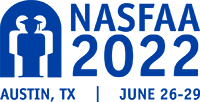Professional Judgment Is K.I.N.D. (Verification Is Not...PJ)
By Megan Walter, NASFAA Policy & Federal Relations Team
Moderator:
David Alexander, Director Financial Assistance Compliance at ECPI University
Speakers:
Daniel Barkowitz, Assistant Vice President for Financial Aid and Veterans Affairs at Valencia College
Craig Slaughter, Director of Financial Aid at Kenyon College
Celena Tulloss, Director of the Office of Financial Aid and Scholarships at the University of Tennessee
Professional judgment (PJ) is a mighty power offered to financial aid administrators by the U.S. Department of Education (ED), yet many of us find ourselves at an impasse when reviewing PJ requests from students. As financial aid professionals, we need to better understand the difference between PJ and verification, and make full use of our statutory authority to apply our expertise on behalf of students. In this session, David Alexander from ECPI University, Daniel Barkowitz of Valencia College, Craig Slaughter from Kenyon College, and Celena Tulloss from the University of Tennessee reviewed the pitfalls and practices of PJ and challenged the session attendees to remember why "KINDness" matters.
The session started by announcing that the number of PJ requests have doubled in this past year due the pandemic, and that professional judgment is a tool that financial aid administrators (FAAs) have to aid struggling students.
Slaughter reminded the audience that FAAs are entitled to their right to complete professional judgments, and while auditors can ask for your documentation and notes regarding a PJ decision, they cannot disagree with your judgment. They also spoke to how verification and professional judgment overlap, explaining that while verification is required to be completed before completing a PJ, there are no required documents for completing a PJ — adequate documentation is up to the FAA performing the PJ.
Another important aspect of completing a PJ, Alexander brought up, was that each FAA completing a PJ must be aware of their own biases and ensure that they are removing any of those biases, implicit or unconscious, before making decisions that may affect the livelihood of their students.
Related to the pandemic, Barkowitz spoke to the recent guidance we've seen passed down from ED regarding professional judgment. The guidance issued on April 3, 2022, just shortly after the CARES Act was signed, made it very clear that FAAs should remember their autonomy to provide PJs, and to do so without concern that a significant increase in PJs on their campus would result in an audit or program review flag.
After outlining the basics of performing a professional judgment, to close the session, the speakers went through some cases that show how certain situations that may arise should be tackled by FAAs, like separation of income due to divorce, or income reduction due to unemployment.
Publication Date: 6/27/2022

You must be logged in to comment on this page.